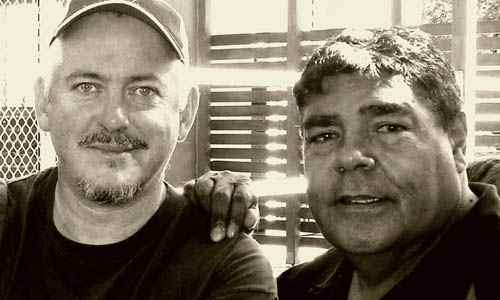

|
Roger Knox - Stranger In My Land


|
|
Roger Knox
The story's right Music is the soul and center of cultural identity. For indigenous peoples, whether the Lakota of America's Great Plains, the Polynesians of Hawaii, or Australian Aborigines, the heart of memory is too often pierced with visions of persecution, theft of ancestral ideals, and genocide. But the human heart is resilient, the stories must be told, and life is a journey worth sharing—no matter the anguish involved. The importance of Roger Knox's Stranger In My Land resides dependably in the celebration and preservation of identity. “Took the Children Away,” is the story of Australia's children who were stolen in the name of white cultural assimilation. Knox was one of them, and one wonders how he has the stamina to sing the Archie Roach composition. Knox grew up in an Aboriginal mission on the border of New South Wales and Queensland. Untold numbers of children were taken from their birth families because the government felt that Aborigines were an “inferior” race and that a brighter future was possible under the influence of white families. Predictably, like indigenous Americans forced into white mission schools, Aborigines now face high rates of infant mortality, alcoholism, and drug addiction. Publicists have offered the press a convenient label for the Australian country western artist and activist. Knox is known in some circles as “the black Elvis.” The moniker works, it is catchy, and firmly anchors him in the creative tradition of American country music. Originally a bass player, Knox turned to singing when he survived two plane crashes in one day that severely burned his hands.
 Jon Langford and Roger Knox Reviews have been stellar and well deserved for Stranger In My Land - a collaboration with Chicago's Pine Valley Cosmonauts who are known in American roots circles for their work with Rosie Flores on Girl of the Century. Jon Langford (Mekons, Waco Brothers) stepped in as producer for Knox and handily guided guest vocals and instrumental performances from Bonnie Prince Billy, Kelly Hogan, Dave Alvin (X, Blasters), Sally Timms and Jon Langford (Mekons), the Sadies, and Andre Williams. The album includes, perhaps, the last known recording from Charlie Louvin of the Louvin Brothers, who guests in the second verse on the song “Ticket to Nowhere.”
All aboard for nowhere Scottish and Celtic influences in Australian music date from the British penal colonies of the late 1700's, but it was WWII and the lonely guitar strumming of the American GI that caught the attention of the Aborigine population. This was “white” music they could relate to. Stranger In My Land is faithful to this tradition. Many of the tunes were previously collected on the soundtrack CD for a critically acclaimed documentary called Buried Country, by Clinton Walker. The accompanying book is currently out-of-print, but you can still find it online. The significance of this recording lies in the testimony it offers to the resilience of persecuted peoples. Some of the Aborigine writers are Knox's peers, and others were his predecessors. Lyrics and instrumentation share a genesis with the spare sound enjoyed by country purists. Unfortunately, Knox does not share the commercial success of countryman Keith Urban, but he should. Roots artists seldom cross over. Fair is fair in an unfair world. In an act of serendipity, Stranger In My Land is “Koori King” Knox's first U.S release, first album overall since 2004, and the end of his nine-year hiatus coincides with the birth of the Idle No More protest movement. Idle No More originated with the indigenous people of Canada. At issue there is a $6 billion tar sands pipeline to the Pacific, which will cross over 40 Native nations. Attawapiskat Chief Theresa Spence focused world attention on the suspension of Canadian environmental regulations. Australia's native peoples have experienced similar disrespect for the land and the spiritual components of their culture. In fact, “indigenous” is a contentious term for the original landholders in Australia. The preferred term is “Koori,” and Knox wears the mantle well. Koori is an ideal in the fight for indigenous rights — not simply a place or birth designation. One could argue that Knox is “silent no more;” adding his voice to that of Chief Spence, the cries of the ghosts walking the ancient King's Highway on the east rift zone of Hawaii's Kilauea volcano, and the chants of the Ghost Dancers of the Lakota resistance at Wounded Knee. This unintentional linkage is profound, and Knox's music offers a palatable remonstration to the theft of tribal lands, cultures, traditions and the desecration of the bones of the ancestors. - Georgianne Nienaber Additional Resources: Koori History
|
|
|
|